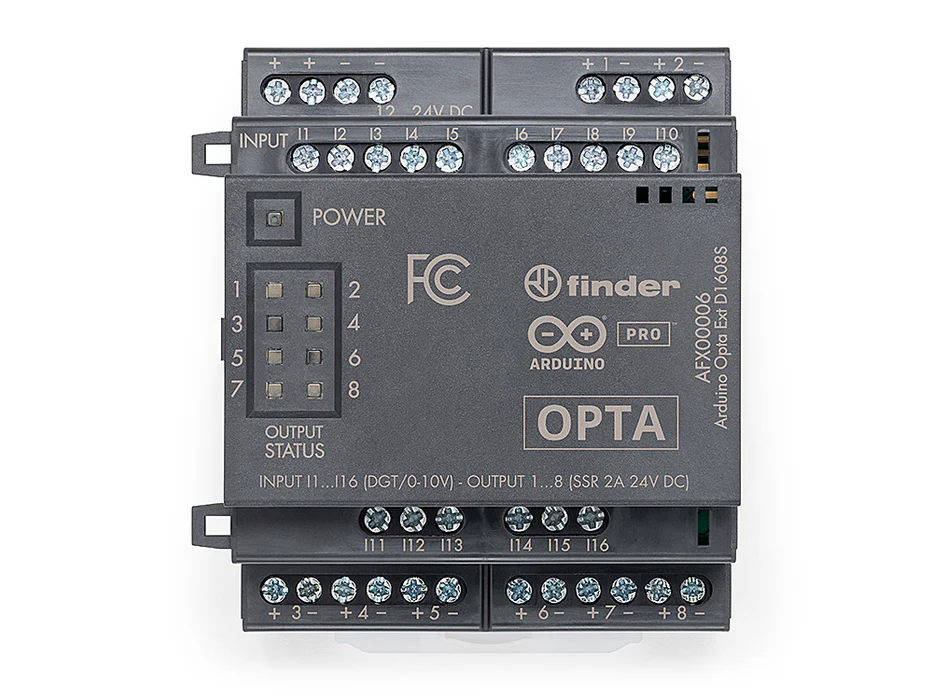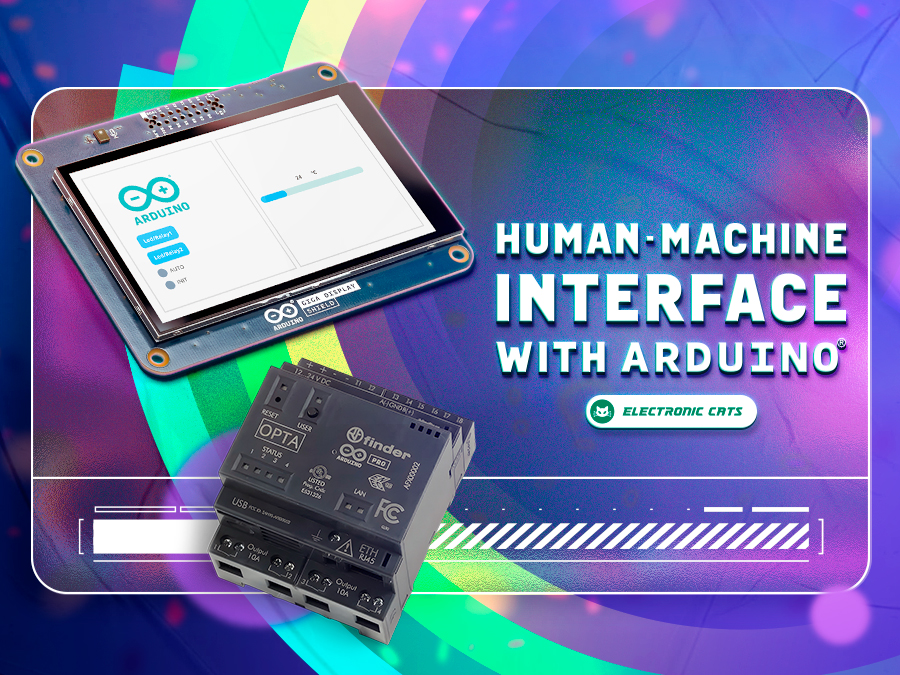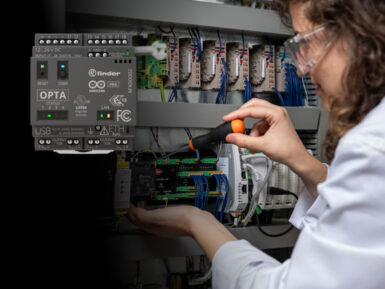
Arduino Pro Opta Ext D1608S
The snap-on expansion module to enhance Arduino Opta’s applications with the addition of 16 programmable voltage inputs and 8 solid-state relays.
Overview
Arduino Pro Opta Ext D1608S enhances your Arduino Opta’s real-time control, monitoring and predictive maintenance applications with the addition of 16 programmable voltage inputs and 8 solid-state relays 24 VDC 2A.
Just snap on the module to extend your system’s capabilities flexibly and quickly, and manage the new I/Os from the Opta base unit seamlessly, taking advantage of the open and widely known Arduino ecosystem or PLC IDE IEC 61131-3 programming environment.
Key benefits:
- Flexible inputs: 16 new inputs for your applications per each expansion added, programmable as digital 0-24 VDC or analog 0-10 V.
- Powerful outputs: 8 solid-state relays offering 24 VDC for 2A each.
- Up to 5 snap-on modules can be managed to multiply and mix a set of I/Os with seamless detection: snap them right next to your Opta base module and use the I/Os as native Opta resources.
- Extend your hardware capabilities while keeping programming accessible, by using the Arduino IDE with its wide range of ready-to-use sketches, tutorials and libraries.
- Put your new I/Os easily to work with the PLC IDE for IEC 61131-3 PLC languages, taking advantage of its low-code approach and pre-mapped resources.
- Extend the Opta’s benefits of real-time remote monitoring via intuitive Arduino Cloud dashboards and secure communication to a wider set of connected devices.
- Reliable by design, thanks to industrial certifications and Finder’s expertise in electronic devices.
- Easy DIN rail installation.
Applications
Opta’s digital expansions are ideal to increase the number of real-time control points in the manufacturing sector and in any building automation project.
The Opta Ecosystem is compatible with all major cloud providers – but choosing the simplicity of Arduino Cloud can really make a difference, for anyone who wants to build, customize and remotely manage their own dashboards.
Looking for a similar option?
Check out the Arduino Pro Opta Ext D1608E, to add 8 electromechanical relays 250 VAC 6A to your Opta-based solution.
Conformities
Resources for Safety and Products
Manufacturer Information
The production information includes the address and related details of the product manufacturer.
Arduino S.r.l.
Via Andrea Appiani, 25
Monza, MB, IT, 20900
https://www.arduino.cc/
Responsible Person in the EU
An EU-based economic operator who ensures the product's compliance with the required regulations.
Arduino S.r.l.
Via Andrea Appiani, 25
Monza, MB, IT, 20900
Phone: +39 0113157477
Email: support@arduino.cc
Documentation
Learn more
Get Inspired

Learn how to build a complete HMI with Arduino that will allow you to interact with your projects in an intuitive and visual way.

OPC Unified Architecture – OPC UA in short – is a cross-platform, open-source machine-to-machine communication protocol for industrial automation. It was developed by the Open Platform Communications (OPC) Foundation and is defined in detail in the IEC 62541 standard. With the release of the Arduino_OPC_UA library we enable users to convert any product from our Arduino Opta range into an OPC UA-enabled device. Step-by-step guide to setting up OPC UA on Arduino Opta It’s as simple as uploading a single sketch onto your Opta and connecting it to an Ethernet network. Once uploaded, the OPC UA firmware exposes the Arduino Opta’s analog and digital inputs, the user button and LED (only Arduino Opta WiFi), as well as its relay outputs as properties that can be read from or written to using OPC UA. OPC UA communication is performed using OPC UA binary encoding via TCP sockets. Arduino_OPC_UA is a port of the Fraunhofer open62541 library implementing IEC 62541 in highly portable C99 for both Windows and Linux targets. One serious challenge during the porting of open62541 was to decide on sensible tradeoffs concerning RAM consumption, as using OPC UAs full namespace zero (NS0) requires up to 8 MB of RAM while the STM32H747 powering the Arduino Opta has a total of 1 MB of SRAM to offer – some of which already allocated by the the Arduino framework for the Arduino Opta. Expand functionality with Arduino Opta Modules and OPC UA integration Additionally, Arduino_OPC_UA supports the automatic discovery, configuration and exposure as OPC UA objects of the recently released Arduino Opta expansion modules. Currently three different expansion modules exist: Arduino Opta Analog Expansion (A0602), Arduino Opta Digital Expansion with electro-mechanical relay outputs (D1608E), and with solid-state relay outputs (DS1608S). During system start-up, the Arduino Opta’s expansion bus is queried for connected expansion modules and automatically configures them and












